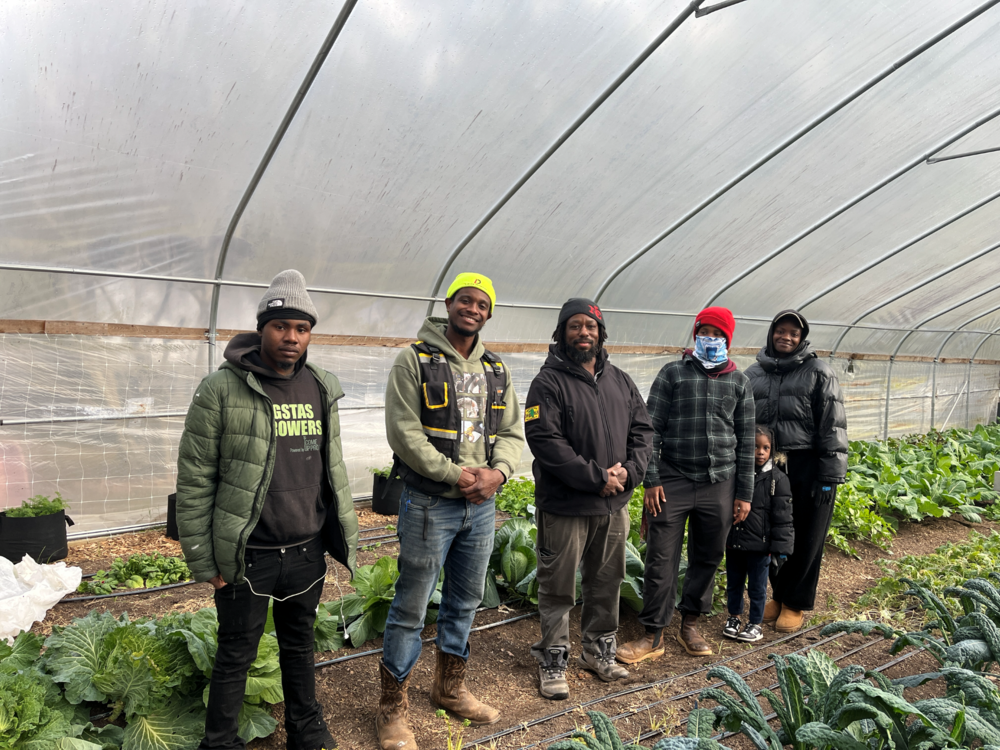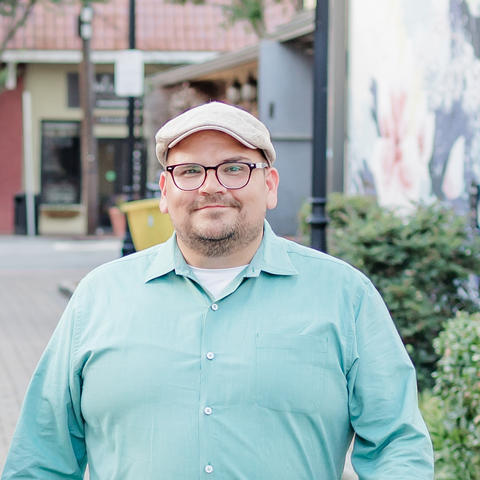
Section Branding
Header Content
Georgia Today: State Senate can subpoena Fani Willis; Deadly accident at Tyson; Gangstas to Growers
Primary Content
On the Friday Dec. 27 edition of Georgia Today: Judge rules that Georgia senators can subpoena DA Fani Willis over alleged misconduct in prosecuting President-elect Trump; a deadly explosion at a Tyson Foods plant in southwest Georgia; and the program empowering at-risk young people through farm work.

TRANSCRIPT
Peter Biello: Welcome to the Georgia Today podcast from GPB News. Today is Friday, Dec. 27. I'm Peter Biello. On today's episode, a judge rules that Georgia senators can subpoena DA Fani Willis over alleged misconduct in prosecuting President-elect Trump. A boiler explosion at a Tyson Foods plant in southwest Georgia kills one and injures several others. And a metro Atlanta program is empowering at risk young people through farm work. These stories and more are coming up on this edition of Georgia Today.
Story 1
Peter Biello: A judge has ruled that the Georgia state Senate can subpoena Fulton County District Attorney Fani Willis as senators look into whether she has engaged in misconduct during her prosecution of President-elect Donald Trump. But Fulton County Superior Court Judge Shukura Ingram is also giving Willis until Jan. 13 to contest whether lawmaker's demands are overly broad. Willis wants the ruling overturned. Her lawyer, former Georgia Gov. Roy Barnes, says she will appeal. A state appeals court earlier this month removed Willis from the Georgia election interference case against Donald Trump and others, citing an appearance of impropriety that might not typically warrant such a removal. The Georgia Court of Appeals panel said in a 2-to-1 ruling that because of the romantic relationship Willis had with special prosecutor Nathan Wade, quote, "Disqualification is mandated and no other remedy will suffice to restore public confidence in the integrity of these proceedings."
Story 2
Peter Biello: One person is dead and several others are injured after an overnight fire at a Tyson Foods plant in Southwest Georgia. Tyson says a boiler exploded at the plant in the city of Camilla. Tyson is the largest employer in Mitchell County. Tyson bought the plant in 2018 as part of its more than $2 billion purchase of Keystone Foods. The plant primarily produces chicken nuggets and chicken filets for restaurants. The company is working with investigators to determine the cause of the fire.

Story 3
Peter Biello: Georgia's legislative session gets underway on Jan. 13. GPB's Sarah Kallis reports on how newly elected lawmakers are preparing.
Sarah Kallis: 22 new state lawmakers will be sworn in on Jan. 13. Democratic state Sen.-elect Rashaun Kemp will be representing part of suburban Atlanta. Kemp, an education activist, says he is most looking forward to continuing his work on education policy.
Rashaun Kemp: I think by and large, there are going to be a lot of areas where we can work together, and that's what I'm really most excited to do.
Sarah Kallis: Republican state Sen.-elect Drew Echols will represent a Hall County district in a seat formerly held by his wife. He says he's excited to serve.
Drew Echols: I've been a fan of politics for a long time. It's a lot of information getting thrown at me in just the past few months. You know, they say it's kind of like drinking from a fire hose and it is.
Sarah Kallis: Echols says he's most interested in transportation and agriculture policy. For GPB News, I'm Sarah Kallis in Atlanta.

Story 4
Peter Biello: The Pew Charitable Trusts' newest fact sheet says the biggest drug problem in America is excessive alcohol use. GPB's Ellen Eldridge has more.
Ellen Eldridge: The study says one strategy to address alcohol misuse is teaching medical professionals to ask patients about their substance use. Frances McGaffey is with the Pew Charitable Trusts. She says drinking is so normalized that people may not realize they're drinking an unhealthy amount.
Frances McGaffey: The big picture is we have a public health crisis in this country that we have not been addressing. And that's unhealthy alcohol use and alcohol use disorder. 170,000 people a year die from alcohol-related causes, and those deaths are preventable.
Ellen Eldridge: McGaffey says alcohol misuse can lead to certain cancers, liver and heart disease, and mental health problems. For GPB News, I'm Ellen Eldridge.

Story 5
Peter Biello: The Gangstas to Growers program is empowering young people in the Atlanta metro area through farm work. Participants are mostly at risk or formerly incarcerated youth who receive job training, mentorship and even martial arts training. The program trains and pays students who complete projects on Black-owned farms at no cost to the farmers. GPB's Amanda Andrews went to Gwinnett County to talk to students graduating from the program about their growth in the soil and as people.
DeVasha McKinney: I'm feeling better than yesterday. It's hard to explain because, you know, if you're looking in the mirror every day, you can't see the change where everyone else can see around you. My name is DeVasha McKinney and I'm a participant of Gangstas to Growers. When I first came in, I feel like not saying misguided, but it was a lot of things that I felt like I know I wanted change, but I didn't know where to start.
Tarik Livingstone: One of our main focuses on educating them is basically life skills, things that we feel that they should have learned in school —or we all should have learned in school.
DeVasha McKinney: We had an herbs class. We have a business class. We have a life coach. We do yoga. We're doing our own.
Tarik Livingstone: Some of them are adults, but they're really start to come to becoming an adult mentally. My name is Tarik Livingstone and I am Participant Support for Ganstas to Growers. As some people in society are scared of these people or they just kind of throw away. They want to work with them before and after this, but not during this time period in their life. Careful.
Jacario Wilson: Both of my brothers was inside of the program before and they graduated. They said it was a good program and I should try it. It helped my mental health and what I got going on through life. And it did. My name's Jacario Wilson and I'm a part of Gangstas to Growers. Since I got in the program, it was like, I ain't really been getting mad how I used to. Like I normally cuss somebody out quick. I like cameras. I like doing everything with cameras and taking pictures and videos and editing videos and and after the program, I'm just going to pursue and just be a camera dude. But I'm still going grow plants. I'm still growing everything inside my house.
Bridget Darby: I believe that it was God that put me here. I did pray a lot; I asked for a lot of things that I got in the program, even ongoing, continuing to my, you know, future plans, like everything is lined up exactly how I wanted it to be. My name is Bridget Darby and I'm part of Ganstas to Growers. We had our capoeira instructor, who's also our farm teacher, Pele. He's very beneficial to us because he also taught us how to defend ourselves.
Pele Ellis: We think of capoeira as just this thing that's just a martial art. Why do you need martial arts? You need to protect the community. My name is Pele Ellis and I am the farm program manager at Ganstas to Growers. Most of the capoeiristas never just did one thing. They were farmers. They were construction workers. They were textile workers.
Bridget Darby: We were taught some self-defense strategies because a lot of us, a lot of people have people in their lives that are abusive. So we're taught how to defend ourselves. I think everybody heading on to what they want to do. If they were questioning about their journey, I feel like everybody has clarity coming towards the end of the program. And I wish everybody nothing but the best.
Peter Biello: You just heard the students in the Gangstas to Growers program at Phoenix Gardens in Lawrenceville. They'll celebrate with the graduation ceremony this evening.
Story 6
Peter Biello: A tech startup launched in Coastal Georgia is about to expand to Atlanta and Dallas. GAGE is a web platform designed for service workers to show their credentials and skills to potential employers. Serial entrepreneur Justin Henshaw of Brunswick founded GAGE to serve workers at a series of restaurants he owned. GAGE was one of a dozen startups chosen to participate in Techstars Accelerators, a three-month program that helps entrepreneurs obtain seed capital and find markets for their products. GAGE began expanding beyond Coastal Georgia with a pilot program at multiple Smoothie King locations in Dallas. Atlanta is next.
Story 7
Peter Biello: Now that Christmas Day has passed, when you're ready to dispose of your Christmas tree, the Army Corps of Engineers will turn your live tree into a fish habitat. The Corps of Engineers will tie trees into bundles, weigh them with concrete anchors, and submerge them into Lake Thurmond or Lake Hartwell. This creates a shelter and food for baitfish. It also creates a nice place for anglers to cast a line. The Corps of Engineers will accept live trees at Lake Thurmond until Jan. 17 and at Lake Hartwell until Jan. 26.

Story 8
Peter Biello: Earlier this week, President Joe Biden announced he was commuting the death sentences of nearly all 40 people facing execution by the federal government, a step seen as a potential turning point in the country's history with the death penalty. Bryan Stevenson, founder and executive director of the Equal Justice Initiative, an organization that works to end mass incarceration and racial injustice, joins GPB's Pamela Kirkland, to discuss that decision and its broader implications.
Pamela Kirkland: The sentences of 37 federal inmates were commuted from the death penalty to life in prison without the possibility of parole. What was your immediate reaction to the announcement? And how significant is this moment in the history of capital punishment in the U.S.?
Bryan Stevenson: Well, I'm really heartened by what President Biden has done. Many people will remember that 30 years ago he was championing the death penalty. It was his efforts as a senator that resulted in an expansion of the death penalty. But over the last three decades, we've seen that capital punishment in this country is ill-fated, unreliable, error-prone and often torturous. And I think the president's evolution mirrors what we've seen broadly in society. And so I see this as a real turning point. I think the president taking this action is a signal to other governors and executives that they also should now be looking to lead and to move us away from this longstanding troubled relationship with killing people to show that killing is wrong. I'm encouraged and I'm hopeful that we can turn this into a real step away from what has been an abusive, bigoted, discriminatory practice for too long.
Pamela Kirkland: You've met with President Biden on several occasions to discuss criminal justice reforms and other things. When it comes to the power of the presidency, historically, presidents offer pardons and commutations toward the end of their term. How does today's commutation compare to what you had advocated for when it comes to the death penalty?
Bryan Stevenson: I'm encouraged by it. It's historic. We've never had a president do something this expansive. There will only be three people left on the federal death row. There will also be a handful of people on the military death row. And I think that's substantial because we spend tens of millions of dollars trying to execute a handful of people. Those resources can now go into improving public safety, providing services to victims. You know, I continue to believe that the death penalty isn't an issue that we should think about by asking whether people deserve to die for the crimes they have committed. I think the threshold question is: Do we deserve to kill when we have a system that too often treats you better if you're rich and guilty than if you're poor and innocent — system that makes the mistakes that our system makes? And what we were stressing with the White House is what we've been stressing with everybody. It's just that this is not an area where we can impose the kind of punishment that requires perfection. And that's what the death penalty requires.
This year, we saw the 200th person exonerated and released after being sentenced to death. That means that for every eight people we've executed in the United States over the last 50 years, one innocent person has been identified. It's a shameful rate of error. Nobody would allow stores to sell apples if we knew that there was a toxin on each apple and if 1 out of 8 apples had that toxin, it would kill you instantly. We would stop selling apples. We wouldn't allow planes to fly with this kind of error rate. But we've tolerated this erroneous death penalty. And I think this is an important signal that we can perhaps do better.
I also think that we've just made a mistake in suggesting that killing people is something we can do casually, easily. You know, most people don't think you you should rape someone who commits rape. Most people don't think you should torture someone who commits torture. But somehow we've allowed ourselves to believe that we can kill people who have killed because that doesn't have an impact. And one of the really significant interventions for President Biden was the submission from correctional officers and wardens who talked about the trauma, the abuse and the hardship that carrying out these executions has created in our federal prisons and in state prisons as well.
Pamela Kirkland: You've highlighted also systemic issues like racial bias. You mentioned wrongful convictions just a moment ago. How does this action address those concerns or does it leave those unresolved?
Bryan Stevenson: Well, I think it is a — it creates an incentive to not overlook, to not look away when we have evidence of bias and discrimination. As you know, at the end of President Trump's term in 2020, he ordered the execution of 13 people in the run-up to the 2020 election. And it's worth noting that in 2020, the Democrats had, as part of their platform, ending the death penalty. President Biden said he would do this and he won that election. President Trump tried to use executions as a way, and sadly, several people were executed despite very significant evidence of racial bias. Black defendants tried by all-white juries. The majority of people on the federal death row are people of color, many of whom were tried by all-white juries. And I think there is this resistance to acknowledging the role of racial bias in the implementation of these sentences. And I think this order today, these commutations suggest that we should not do that. We have a long history of racial injustice in America, and it's created a presumption of dangerousness and guilt that sometimes gets assigned to Black and brown people. And in our criminal legal system, that can be lethal when the death penalty is on the table. And I'm hoping that today's commutations can be an opportunity to talk more about these problems that we continue to have in our legal system, from racial bias to errors to prosecutorial misconduct to legal discrimination and jury selection — to all the things that undermine the integrity of our system.
Pamela Kirkland: The decision impacts federal death row, but states continue to execute people. We're in Georgia. Georgia has long been at the center of debates over the death penalty. How do you hope this federal action influences state-level policy?
Bryan Stevenson: Well, I hope that governors in several states that have talked about this will now find the courage to do what must be done. The largest death row in the country is in California. Gov. Newsom has talked about the challenges of the death penalty in that state. I was in North Carolina earlier last year in litigation that exposed racial bias in the death penalty in that state. And Gov. Roy Cooper and the incoming governor will have an opportunity to think about following President Biden's leads. There are governors in Oregon and other states — Pennsylvania — where I think there will be an opening now to seriously consider replicating this. And that would be substantial. It would potentially reduce the number of people on death row in this country by half. Yesterday's order by President Biden impacts 37 people. But if these other governors follow suit, we could be talking about reducing the number of people facing execution by, by over a thousand, which would really be substantial as we continue to wrestle with this issue.
Peter Biello: That Bryan Stevenson, founder and executive director of the Equal Justice Initiative, speaking with GPB's Pamela Kirkland.
Story 9
Peter Biello: In sports. In the NBA, the Atlanta Hawks rallied from a late 21-point deficit by scoring 50 points in the fourth quarter to beat the Chicago Bulls last night, 141 to 133. Jalen Johnson had a career-high 30 points. Trae Young scored 27, surpassing the 11,000 career point mark, and added 13 assists as the Hawks won their second straight. Atlanta hosts the Miami Heat tomorrow.
And thank you so much for tuning in to Georgia Today. We truly appreciate you tuning in. We hope you'll tune in on Monday as well. The best way to remember to do that is to subscribe to this podcast. That way we pop up automatically in your feed on Monday afternoon. And over the weekend, you can be sure to find the latest headlines at GPB.org/News. And if you've got feedback or a story idea, something you think we should be covering, let us know by email. The address is GeorgiaToday@GPB.org. I'm Peter Biello. Have a great weekend. We'll see you on Monday.



